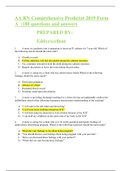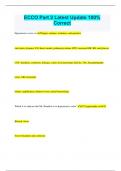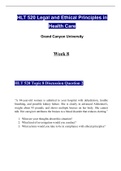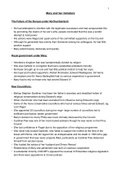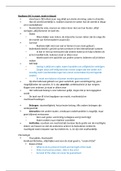Page 1 of 88
LAW OF CONTRACT
STUDY UNIT 1
1. Distinguish between a contract and unjustified enrichment. (5)
A contract is an agreement entered into with the intention of creating an obligation or obligations. A contract
is therefore a fact, an event. From a contract, arises an obligation or obligations.
Undue enrichment is a principle of our law that no-one should unjustifiedly be enriched at the expense of
another.
Here undue enrichment means that there is no valid legal ground for the one's obtaining a benefit at the
expense of the other.
2. State the requirements for the formation of a valid contract. (5)
(1) There must be agreement (consensus) or ostensible agreement between the parties.
(2) The parties must have capacity to act.
(3) The performance must be possible at the time the contract is entered into.
(4) The conclusion of the contract, the performance and the object of the contracting parties must be
lawful (the contract must in other words be legal).
(5) Constitutive formalities must be complied with.
3. Distinguish civil obligations from natural obligations. (5)
Whereas a civil obligation may be enforced directly by recourse to a court of law, a natural
obligation may not.
A natural obligation does, however, have some legal effect:
it is a legal relationship as opposed to a merely moral relationship, and just as in the case of a civil
obligation, it can be validly discharged, is capable of indirect enforcement by way of set-off and can serve
as the basis of an accessory contract such as suretyship.
An example of a natural obligation is a contractual obligation that requires a minor who acted without
the necessary consent, to perform something, or an obligation which requires the payment of a
wagering or gambling debt.
4. Distinguish between a contract and an obligation. (5)
A contract is an agreement entered into with the intention of creating an obligation or obligations. A
contract is therefore a fact, an event. A contract is, however, not a simple fact but rather a legal fact, that
is a fact or set of facts to which the law attaches consequences. Obligations thus arise from legal facts.
From a contract, arises an obligation or obligations. An obligation is a juristic bond in terms of which the
party or parties on the one side have a right to a performance and the party or parties on the other side
have a duty to render that performance. In other words it is a legal relationship between two or more legal
subjects.
,Page 2 of 88
5. Distinguish between agreements creating obligations, agreements extinguishing debts and real
agreements. (5)
• Agreements creating obligations (contracts)
Agreements of this nature are nothing but contracts. This is by far the most important of the three
agreements
• Agreements extinguishing a debt
An agreement extinguishing a debt is one in terms of which an obligation is terminated, for example
release or discharge. Discharge is achieved by the debtor's performing what he has undertaken to
perform with the consequence that the obligation concerned is terminated in a natural way.
• Real agreements
A real agreement is an agreement whereby a right is transferred. Real rights, for example ownership,
are transferred by delivery (movable property) or registration.
• Overlapping of obligationary, extinguishing and real agreements
Obligationary, extinguishing and real agreements may sometimes overlap to a greater or lesser
extent.
For example, suppose D walks into a cafe, puts his R5 on the counter and points to a packet of sweets.
The proprietor takes his money and hands over the sweets.
6. Explain the difference between a void contract and a voidable contract. (5)
Misrepresentation, duress or undue influence, can only render a contract voidable, because in such a
case there is consensus, so that the contract cannot be void, but the consent has been obtained in an
improper manner, rendering the contract assailable.
A void contract creates no obligations.
A contract which is merely voidable does create obligations, and these obligations then exist until
the contracting party who has the election (choice) decides to terminate them.
He is not, however, obliged to terminate them and if he does not, the obligations continue to exist
unaffected.
,Page 3 of 88
STUDY UNIT 2 1.
Indicate in two sentences the meaning of the maxim plus valet quod agitur quam quod simulate
concipitur.
The rule means that in the case of simulated acts the true intention of the parties will be given
effect. The simulated agreement will therefore be void. Where neither of the parties has the intention to be
bound, but they create the impression outwardly that they do have such intention, a simulated juristic act
exists because there is no juristic consensus. The law judges such an act in terms of the true intention of
the parties. Inter partes effect is given to the true intention of the parties; however, if this could
prejudice outsiders, the impression created by the parties may be upheld against them by means of the
doctrine of estoppel.
STUDY UNIT 3 1.
Briefly distinguish simple auctions from auctions subject to conditions. (5)
In a simple auction, the bidder makes an offer which the auctioneer then considers and either accepts or
rejects.
The offer is made to a definite person, the auctioneer.
An auction subject to conditions is different.
The conditions may relate to many things. The conditions may be advertised beforehand, in a newspaper
or in a catalogue or announced at the auction itself.
With an auction subject to conditions, one is dealing with two potential contracts: firstly, the contract
that binds the parties to the auction conditions and secondly, the substantive contract of sale.
When an auctioneer announces that an auction is to be held subject to conditions, he is making an offer.
He is free to revoke the offer before it is accepted. Any person who bids for an article thereby makes it
known that he agrees to the conditions (accepts the offer) laid down by the auctioneer and a contract to
that effect arises. Once a person starts bidding, he is then making an offer on the substantive sale, which
the auctioneer can accept or reject. Once the auctioneer has accepted the highest bona fide bid, a contract
of sale arises.
2. STATE the circumstances in which an offer lapses. (5)
* after the expiry or lapse of the prescribed time, or of a reasonable time
* upon the death of either the offerer or the offeree
* upon being rejected
* upon revocation
, Page 4 of 88
3. Discuss whether an advertisement and a promise of reward respectively constitute an offer. (10)
Although an advertisement generally amounts to no more than an invitation to do business, a promise of
reward is regarded as a special type of advertisement which does amount to an offer. It is a requirement for
a valid offer that the offer must contemplate acceptance and a resultant obligation. The advertiser's
intention is to invite an offer from some member of the general public - he does not make an offer, which
can be accepted. The above-mentioned requirement is therefore not generally complied with in the
case of advertisements. However, in the case of a promise of reward, a reward is offered to any person
who performs a certain act. Once the required act has been performed, the offer contained in the promise
of reward is accepted and a contract arises.
4. X attends an auction of certain immovable property. The auction is held subject to certain
conditions one of which is that the property may not be sold for less than R100 000. X bids R110
000 but soon sees that no one else is going to bid for the property and he informs the auctioneer
that he is retracting his bid of R 110 000 and is bidding only R 100 000. The auctioneer ignores this
statement of X and knocks down the bid of R11 0000.
4.1 What contract(s) are we dealing with here?
We are dealing with two potential contracts: first, the contract which binds the parties to the auction
conditions, and second, the substantive contract of sale. When the auctioneer announces that the
auction is to be held subject to certain conditions, he indicates that this is the basis on which the auction will
be held. Any person who bids for an article offered for sale, thereby makes it known that he agrees to the
conditions. The auctioneer's offer regarding the auction conditions has therefore been accepted, and the
conditions now bind both parties. If the prospective buyer makes a bid, and the auctioneer accepts it, a
substantive contract arises.
4.2 May X retract his bid?
Yes. X may revoke his offer before the auctioneer has knocked down on the bid because an offer is
revokable before acceptance. X's bid of R110 000 fulfils a dual function: on the one hand, it is an
acceptance of the auctioneer's offer that the auction will be subject to the conditions stated, and on
the other, it is an offer for the immovable property.
The contract of sale is, however, only concluded once the auctioneer accepts X's offer by knocking down
on the bid. Before the offer is accepted, no legal relationship exists between the offerer (X) and the offeree
(the auctioneer). X can therefore freely revoke his offer at any time before the auctioneer accepts it.



